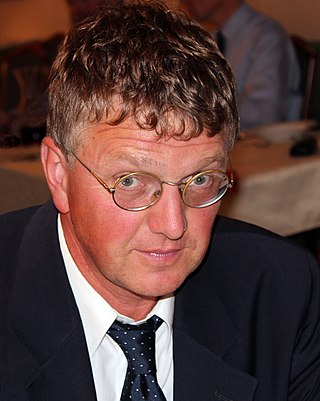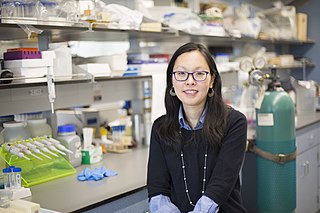Related Research Articles

Jacqueline K. Barton, is an American chemist. She worked as a professor of chemistry at Hunter College (1980–82), and at Columbia University (1983–89) before joining the California Institute of Technology. In 1997 she became the Arthur and Marian Hanisch Memorial Professor of Chemistry and from 2009 to 2019, the Norman Davidson Leadership Chair of the Division of Chemistry and Chemical Engineering at Caltech. She currently is the John G. Kirkwood and Arthur A. Noyes Professor of Chemistry.

In chemistry, a foldamer is a discrete chain molecule (oligomer) that folds into a conformationally ordered state in solution. They are artificial molecules that mimic the ability of proteins, nucleic acids, and polysaccharides to fold into well-defined conformations, such as α-helices and β-sheets. The structure of a foldamer is stabilized by noncovalent interactions between nonadjacent monomers. Foldamers are studied with the main goal of designing large molecules with predictable structures. The study of foldamers is related to the themes of molecular self-assembly, molecular recognition, and host–guest chemistry.

Ronald T. Raines is an American chemical biologist. He is the Roger and Georges Firmenich Professor of Natural Products Chemistry at the Massachusetts Institute of Technology. He is known for using ideas and methods of physical organic chemistry to solve important problems in biology.

William (Bill) DeGrado is a professor at the University of California, San Francisco, where he is the Toby Herfindal Presidential Professor of Entrepreneurship and Innovation in the Department of Pharmaceutical Chemistry. As an early pioneer of protein design, he coined the term de novo protein design. He is also active in discovery of small molecule drugs for a variety of human diseases. He is a member of the U.S. National Academy of Sciences (1999), American Academy of Arts & Sciences (1997) and National Academy of Inventors. He also is a scientific cofounder of Pliant therapeutics.

Peter B. Dervan is the Bren Professor of Chemistry at the California Institute of Technology. The primary focus of his research is the development and study of small organic molecules that can sequence-specifically recognize DNA, a field in which he is an internationally recognized authority. The most important of these small molecules are pyrrole–imidazole polyamides. Dervan is credited with influencing "the course of research in organic chemistry through his studies at the interface of chemistry and biology" as a result of his work on "the chemical principles involved in sequence-specific recognition of double helical DNA". He is the recipient of many awards, including the National Medal of Science (2006).

Morten Peter Meldal is a Danish chemist and Nobel laureate. He is a professor of chemistry at the University of Copenhagen in Copenhagen, Denmark. He is best known for developing the CuAAC-click reaction, concurrently with but independent of Valery V. Fokin and K. Barry Sharpless.
Jack Leonard Strominger is the Higgins Professor of Biochemistry at Harvard University, specializing in the structure and function of human histocompatibility proteins and their role in disease. He won the Albert Lasker Award for Basic Medical Research in 1995.
Laura Lee Kiessling is an American chemist and the Novartis Professor of Chemistry at the Massachusetts Institute of Technology. Kiessling's research focuses on elucidating and exploiting interactions on the cell surface, especially those mediated by proteins binding to carbohydrates. Multivalent protein-carbohydrate interactions play roles in cell-cell recognition and signal transduction. Understanding and manipulating these interactions provides tools to study biological processes and design therapeutic treatments. Kiessling's interdisciplinary research combines organic synthesis, polymer chemistry, structural biology, and molecular and cell biology.

Martin Gruebele is a German-born American physical chemist and biophysicist who is currently James R. Eiszner Professor of Chemistry, Professor of Physics, Professor of Biophysics and Computational Biology at the University of Illinois Urbana-Champaign, where he is the principal investigator of the Gruebele Group.

András Perczel is a Hungarian chemist, biochemist, university professor, an elected member of the Hungarian Academy of Sciences. His major field of research is structural chemistry and biology including synthesis of biomolecules and NMR spectroscopy of peptides and proteins. He was awarded the Bolyai prize in 2011.
Craig M. Crews is an American scientist at Yale University. He is the John C. Malone Professor of Molecular, Cellular, and Developmental Biology, and also holds joint appointments in the departments of Chemistry and Pharmacology. Crews is the Executive Director of the Yale Center for Molecular Discovery and a former Editor of the journal Cell Chemical Biology. His research interests focus on chemical biology, particularly on controlled proteostasis. Crews is a pioneer in the field of targeted protein degradation and his lab's research led to the development of the anti-cancer drug carfilzomib (Kyprolis). He is the founder of Arvinas, the first biotechnology company to bring PROTAC drugs into clinical trials. In 2019, he was named an American Cancer Society Research Professor at the Yale University.
Gangadhar J. Sanjayan is an Indian bioorganic chemist, scientist and the head of The Sanjayan Lab at the National Chemical Laboratory, Pune. He is known for his researches on the synthesis of designer peptide/protein mimetics and hetero-foldamers and is a recipient of the Bronze Medal of the Chemical Research Society of India. The Council of Scientific and Industrial Research, the apex agency of the Government of India for scientific research, awarded him the Shanti Swarup Bhatnagar Prize for Science and Technology, one of the highest Indian science awards, in 2012, for his contributions to chemical sciences.

Marcey Lynn Waters is the Glen H. Elder Jr., Distinguished Professor of Chemistry at the University of North Carolina, Chapel Hill (UNC-CH). She is an organic chemist whose research is at the interface of chemical biology and supramolecular chemistry. Waters has received multiple awards for research, teaching, and advocating for women in science. She is serving the President of the American Peptide Society (APS) from 2017 to 2019.
Ann E. McDermott is an American biophysicist who uses nuclear magnetic resonance to study the structure, function, and dynamics of proteins in native-like environments. She is currently the Esther Breslow Professor of Biological Chemistry and Chair of the Educational Policy and Planning Committee of the Arts and Sciences at Columbia University. She has also previously served as Columbia's Associate Vice President for Academic Advising and Science Initiatives in the Arts and Sciences. She is an elected member of both the American Academy of Arts and Sciences and the National Academy of Sciences.

Jin Kim Montclare is a Professor of Chemical and Biomolecular Engineering at New York University. She creates novel proteins that can be used in drug delivery, tissue regeneration and as medical treatment. She is a 2019 AAAS Leshner Leadership Fellow and has been inducted to the AIMBE College of Fellows.

Mei Hong is a Chinese-American biophysical chemist and professor of chemistry at the Massachusetts Institute of Technology. She is known for her creative development and application of solid-state nuclear magnetic resonance (ssNMR) spectroscopy to elucidate the structures and mechanisms of membrane proteins, plant cell walls, and amyloid proteins. She has received a number of recognitions for her work, including the American Chemical Society Nakanishi Prize in 2021, Günther Laukien Prize in 2014, the Protein Society Young Investigator award in 2012, and the American Chemical Society’s Pure Chemistry award in 2003.
Barbara Imperiali is a Professor of Biology and Chemistry at Massachusetts Institute of Technology and Affiliate Member of the Broad Institute. She is an elected member of the National Academy of Sciences and a Fellow of the Royal Society of Chemistry.
Alessio Ciulli is an Italian British biochemist. Currently, he is the Professor of Chemical & Structural Biology at the School of Life Sciences, University of Dundee, where he founded and directs Dundee' new Centre for Targeted Protein Degradation (CeTPD). He is also the scientific co-founder and advisor of Amphista Therapeutics.

Yu-Shan Lin is a computational chemist. She is an associate professor of chemistry at Tufts University in the United States. Her research lab uses computational chemistry to understand and design biomolecules, with topics focusing on cyclic peptides, protein folding, and collagen.
Anne Michelle Baranger is an American chemist who is professor of chemistry at the University of California, Berkeley. She is the associate dean for diversity, equity, and inclusion. Her research considers the experiences of chemistry students and ways to increase the number of students studying STEM subjects.
References
- 1 2 3 "Alanna Schepartz | College of Chemistry". chemistry.berkeley.edu. Retrieved 2020-07-28.
- 1 2 "Alanna Schepartz CV" (PDF). Archived from the original (PDF) on March 3, 2016. Retrieved June 3, 2019.
- ↑ "Faculty: Alanna Schepartz". Yale Department of Chemistry. Archived from the original on May 13, 2019. Retrieved June 3, 2019.
- ↑ "Alanna Schepartz named Harris Professor". Yale Bulletin and Calendar. April 28, 2000. Archived from the original on October 21, 2012. Retrieved August 12, 2012.
- ↑ "Alanna Schepartz To Deliver First Chemical Biology Lecture". YaleNews. December 11, 2009. Archived from the original on July 24, 2011. Retrieved August 12, 2012.
- ↑ "Alanna Schepartz appointed Sterling Professor of Chemistry". Yale University. March 27, 2017. Retrieved June 3, 2019.
- ↑ "Department of Chemistry welcomes new faculty". May 10, 2019. Retrieved June 3, 2019.
- ↑ "Schepartz Laboratory of Chemical Biology". Yale.edu. Archived from the original on June 4, 2019. Retrieved June 3, 2019.
- ↑ "Alanna Schepartz". David and Lucile Packard Foundation. Retrieved June 3, 2019.
- ↑ "Ronald Breslow Award for Achievement in Biomimetic Chemistry" . Retrieved June 3, 2019.
- ↑ "Alanna Schepartz". National Academy of Sciences. April 1, 2014. Retrieved June 3, 2019.
- ↑ "American Chemical Society names preeminent Yale University professor Alanna Schepartz, Ph.D., as new editor-in-chief of Biochemistry". American Chemical Society. August 3, 2016. Retrieved June 3, 2019.